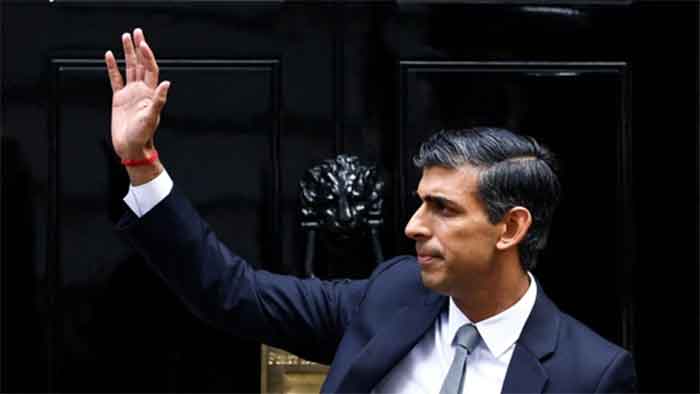
Having taking over United Kingdom’s government as its youngest Prime Minister in 200 years, the first Brown and Hindu to do so, Rishi Sunak is certainly not gifted with a magical wand or any other power to resolve the chaotic problems faced by his country and its citizens. The importance given in Indian circles to his religious identity and colour would certainly have carried great importance in Indian politics. At present, even educated Indians seem quite awe-struck by Sunak assuming UK’s premiership, because of his “Indian roots” as well as colour. So do they expect these factors to play a major role in manoeuvring political cards in his favour in UK? Chances of his colour or religion resolving crises in UK are non-existent. In India, of course, this seems to be the golden rule (particularly usage of religious cards) for political gains. But what can turn electoral tide in India cannot play the same role in Great Britain. Yes, issues linked with religious frenzy as well as communalism irrespective of risks they pose for Indian secularism seem to be raised time and again on Indian soil particularly when elections are round the corner. It is not without reason that Delhi Chief Minister Arvind Kejriwal has started talking of “images” of certain Hindu deities on Indian currency notes. He probably expects this “religious” move to help him gain success in forthcoming elections. He can afford to do so on Indian soil.
But however religious Sunak maybe, even assuming usage of any such move would be equivalent to his digging his own political grave. It is simply not because of images of deities on currency notes cannot be expected to spell economic gains for any country and/or its population. People want a result-oriented government with a constructive approach. With respect to India, there have been instances when last minute “rhetoric” with emphasis on issues such as anti-Pak card, communal hype, Kashmir-issue and so forth have apparently compelled voters to take crucial electoral decisions.
Hindus constitute less than two percent of population in UK. Perhaps a little too much importance is being given to Sunak being a Brown. United States has led the way on this front by having first African-American- Barack Obama – as its President. Besides, as suggested earlier, Sunak’s colour or religion is not going to be of any help in even easing complex issues bothering UK.
It may be noted, political situation in UK may have been different if Sunak had not chosen to quit office in July this year when Boris Johnson was the Prime Minister. His resignation has also been described as a sign of rebellion against Johnson. Chances of Boris and his supporters being pleased with this move of Sunak may be viewed as non-existent. The fact that Liz Truss, who succeeded against Sunak, was viewed as an ally of Boris cannot be ignored. Of course, the hard reality of Truss not being able to stay in power for too long stands out markedly. So does that of Boris having stepped back from his having briefly considered the option to consider joining leadership race to succeed Truss.
At present, it seems entry into 10 Downing Street has been an easy one for Sunak. It certainly has been when compared to his having failed while competing with Truss a few weeks ago. But he is still headed for facing numerous challenges. Of these, easing economic woes of people is one which is probably the toughest. For him, personally, no less significant would be the number of days, weeks, perhaps months he succeeds staying in office. Considering that Johnson has still not abandoned options of stepping into 10 Downing Street as the Prime Minister, Sunak may have to encounter several political hurdles within his own party to remain in office.
Sunak is definitely a good speaker. But rhetoric is least likely to help him ride over problems which have pushed Boris and then Truss out of office. He is the fifth UK PM in six years, the third within less than two months. Sunak’s weakness and to a degree political inexperience has already surfaced with his appointment of Suella Braverman as Home Secretary. She had been appointed to this post earlier by PM Truss but had to resign because of an alleged breach of security. She has apparently succeeded in getting her job back because she backed Sunak in his race. Yet, her being fairly unpopular for her offence- alleged breach of security- cannot be brushed away. She is also known for her anti-migrant stance. This has certainly provided Labour Party sufficient ground to target Tory Party.
In addition to Sunak displaying his “expertise” in tackling UK’s economic woes, it is to be watched whether he gets enough time to handle political problems. His leadership as well as political expertise is going to face a major test in keeping check on intra-party turmoil that Conservative Party is probably going through. Not much can be expected if he fails to keep his party together. However much importance Indian media gives to his conversation with his Indian counterpart, this is not going to help him in taking care of problems UK is battling with, economically and politically. Whatever be nature of hype raised about Sunak’s identity in India, its relevance is limited to those delving on it, practically none for the present British premier also. Rather, the fact that brown citizens of UK are more concerned about asserting their British identity cannot be ignored. If Sunak slips due to lack of support from his own party and/or some other reason, general elections to elect the next premier may not be too far off!
Nilofar Suhrawardy is a senior journalist and writer with specialization in communication studies and nuclear diplomacy. She has come out with several books. These include:– Modi’s Victory, A Lesson for the Congress…? (2019); Arab Spring, Not Just a Mirage! (2019), Image and Substance, Modi’s First Year in Office (2015) and Ayodhya Without the Communal Stamp, In the Name of Indian Secularism (2006).












































